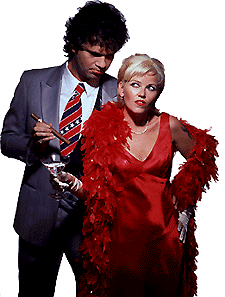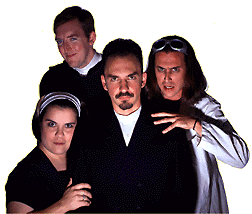There are few kinks to work out in BRO’s fine ‘Preservation’
–by Dean Johnson/Music Review | Boston Herald |10/03/98
“Preservation,” a two-act rock opera by the Boston Rock Opera Company
at Tower Auditorium, Mass. College of Art,
Fridays and Saturdays through Oct. 17.
Human nature never changes, and the proof is in the Boston Rock Opera company’s production of Kinks frontman Ray Davies’ “Preservation.”
Until this week, “Preservation” hadn’t been performed in its entirety since the Kinks last performed it in 1974. But the piece, dubbed “a morality play” by its author, is in many ways more contemporary now than when it was written.
A onetime honorable man (Mr. Flash) has become a corrupt businessman and politician who is opposed by the superpious Mr. Black, who favors mind control to legislate his own particular brand of morality. As the two forces clash, the little people are caught in the middle.
The setting is the imaginary Village. It might as well be Washington, D.C. Everyman is portrayed by the Tramp, the only one who makes any real sense. He watches all the madness without getting involved and ultimately is the only one to escape with wits and integrity intact. Because the production hasn’t been performed in nearly a quarter of a century, the only real precedent for the BRO are the two “Preservation” albums recorded by the Kinks.
The group is true to the spirit of Davies’ original music — so true that the Tramp (Peter Moore) and Flash (Mick Maldonado) sound uncannily like Davies in places.
Moore plays the Tramp with a carefree, loose-limbed grace a little reminiscent of the Scarecrow in “The Wizard of Oz,” while Maldonado’s Flash is a wonderfully unctuous soul, in part, perhaps, because Davies has said Flash has more of him than any other character in the production.
Other standouts are Brian Gottesman as an insidious Mr. Black and Letters to Cleo singer Kay Hanley, who vamped it up as Flash’s girlfriend Belle.
Though Thursday’s opening performance had its share of technical glitches (dead mikes, missed lighting cues, unbalanced singers-vs.-band sound levels), it was an fun night, especially for Kinks fans.
Davies’ original tunes range from feisty pop and raging rock to English dance hall ditties, with a little country and western thrown in. The music, particularly ensemble numbers such as “Here Comes Flash,” “He’s Evil” and “Money Talks,” holds up well. And “Sweet Lady Genevieve” is as wistful and sweet as anything he’s written.
Jane Bulger’s choreography and Eleanor Ramsay’s direction add enough action and visual appeal to flesh out the story. But like any opera, the music carries the real message.
Even Davies, who took in last Sunday’s dress rehearsal, was impressed. His response to seeing his onetime pet project brought to life onstage for the first time in nearly 25 years:
“It was worth the wait.”
Who are we to disagree?
(c) 1998 The Boston Herald




